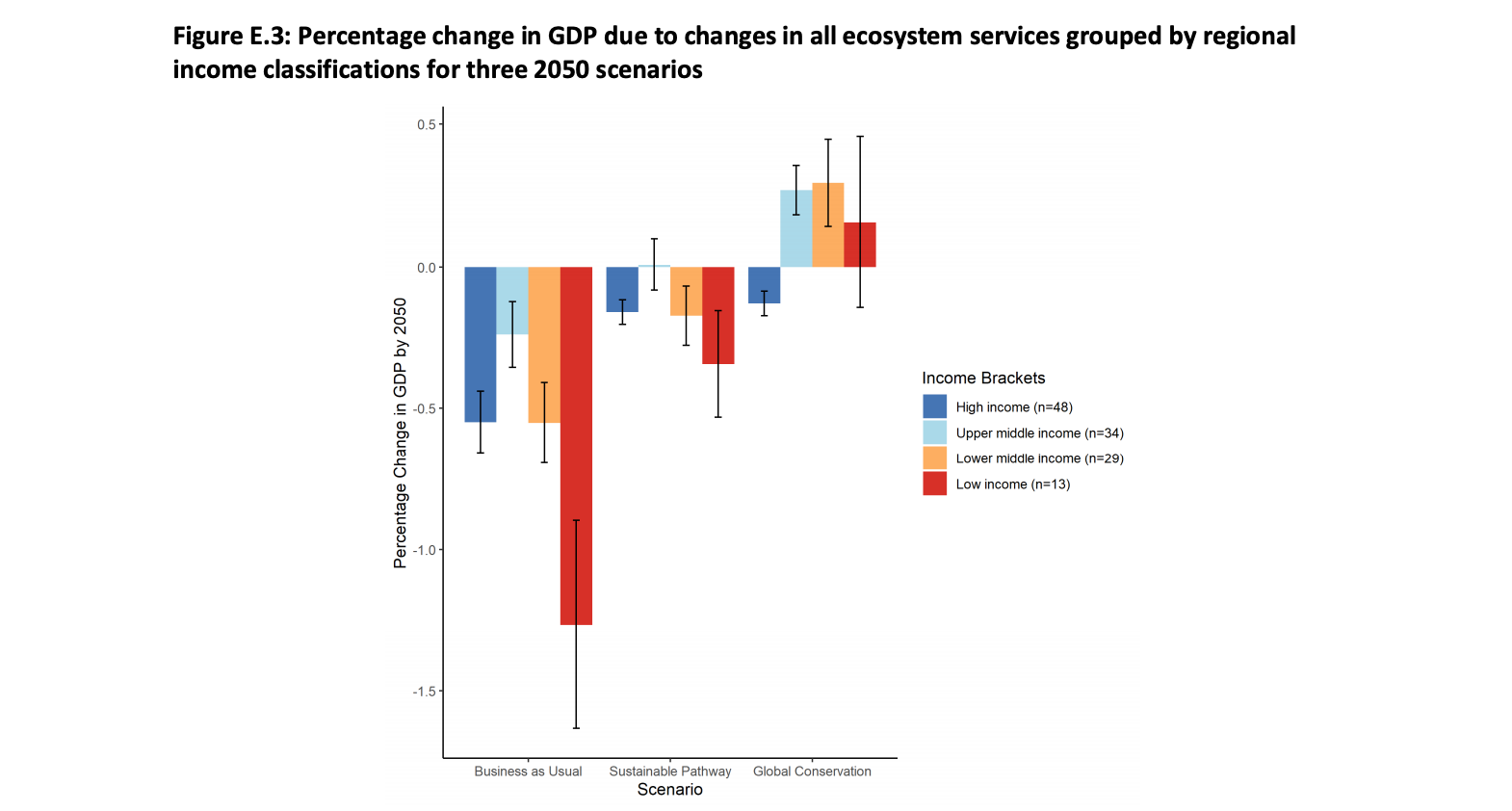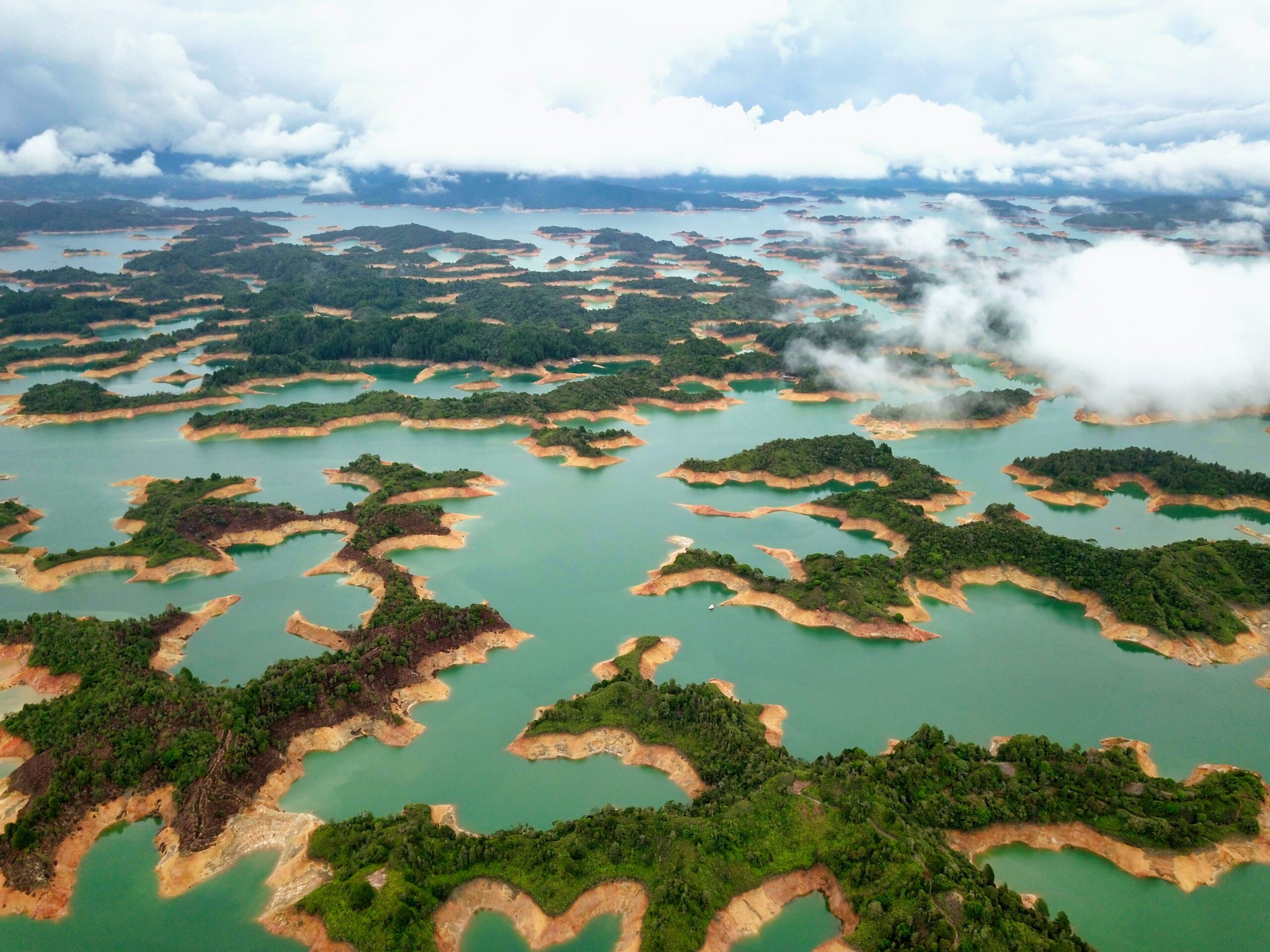
A new report from WWF calculates the economic costs of inaction on our climate and ecological crises. Unless urgent action is taken, the world could face a loss of US$9.87 trillion in GDP by 2050.
However, this is a deeply conservative estimate based on the analysis of just six ecosystem services — with more (and more reliable) data on the value of further services, the projected economic impacts are certain to increase significantly.
The study, Global Futures, analysed the impacts of ecosystem service decline in timber production, coastal protection, fisheries, agricultural pollination, water supply and carbon storage. The analysis spanned 140 countries under three scenarios: ‘Business-as-Usual’, ‘Sustainable Pathway’ and ‘Global Conservation’. As its name suggests, the ‘Business-as-Usual’ scenario is based on a continuation of current production and consumption habits across the world. Unsurprisingly, this scenario was found to bear the greatest economic cost, with the U.S., Japan and the UK economies facing losses of US$83, $80 and $21 billion every year, respectively.
Even the ‘Sustainable Pathway’, the median scenario based on the realisation of current sustainability ambition in the global community, results in a US$129 billion loss in global GDP per year by 2050.
The report also stresses that the impacts of nature’s decline will be felt unevenly across the world. GDP loss as a percentage of total GDP was predicted to be greatest in countries such as Madagascar, Togo and Vietnam, at 4.2%, 3.4% and 2.8% per year in ‘Business-as-Usual’, eroding any potential for growth and development that these countries may have had.
The results highlight how extreme flooding, droughts, coastal erosion and rising food prices can drive economic losses and exacerbate existing global inequalities.
Marco Lambertini, Director General of WWF International, said:
“This ground-breaking study shows how conserving nature is not only a moral issue but a social and economic one. Not only will losing nature have a huge impact on human life and livelihoods, it will be catastrophic for our future prosperity. People across the world are already feeling the impact of rising food prices, droughts, commodity shortages, extreme flooding and coastal erosion. Yet for the next generation things will be many times worse, with trillions wiped off world economies by 2050.”
However, the ‘Global Conservation’ scenario — the most optimistic scenario, which builds on the ‘Sustainable Pathway’ ambition with further policies to protect and restore natural habitats — was found to benefit global GDP (US$11 billion per year by 2050) as well as global equity. Low-income countries that would see the largest loss under the ‘Business-as-Usual’ scenario also stand to gain the most from the ‘Global Conservation’ scenario relative to total GDP.* This is primarily due to better land-use planning, including protecting lands and limiting agricultural expansion.

This research, produced through a partnership between WWF, the Global Trade Analysis Project and the Natural Capital Project, is a novel approach to valuing ecosystem services in a way that is relevant to decision-makers.
Currently, the value of natural capital and many ecosystem services are unknown or undervalued, meaning they are largely invisible to decision-makers. These results not only demonstrate that a continuation of business-as-usual would be fundamentally damaging to the economy, the environment and society, but that the current level of ambition for a sustainable future must be significantly raised even to secure current levels of prosperity, let alone enhance them.
The value of natural capital and the ecosystem services that flow from it must be embedded in public and private sector decision making if we are to deliver a climate-safe and more equitable future for ourselves, and for generations to come. These results offer a glimpse of the economic consequences of inaction, presenting an irrefutable case for greater ambition from businesses and policymakers alike.
But, it cannot be overstated that the predictions of this report — based on just six of the incomprehensible number of ecosystem services that nature provides to people — are acutely conservative. For example, soil quality provides numerous ecosystem services, such as carbon storage, nitrogen retention, water regulation and agricultural production, to name just a few. Data on global soil quality is due to be made available in 2020 and could significantly alter the results of the study by highlighting compounding consequences. The interconnectedness of ecosystem services means that, as more services are modelled, the impacts in each scenario will be amplified, meaning a ‘Business-as-Usual’ case may be worse than currently predicted, and a ‘Global Conservation’ future could present far greater benefit.
This study provides further evidence against the perceived dichotomy between conservation and prosperity. With greater consideration of natural capital values in policy and land-use planning, conservation of the environment can benefit nature, people and the global economy, and businesses can lead this change — and benefit from it — once they understand this.
As our CEO, Mark Gough, said:
“The findings in this study will have serious implications for business. There are some leading businesses who are already working to identify their impacts and dependencies on nature and people, and they will be in a stronger position to address the challenges this study sets out. As investors also start to better understand these risks, it will increasingly affect businesses’ access to finance, strengthening the need for them to act.”
The Global Futures report comes at a critical time for action on climate and the environment. 2020 is touted to be a ‘Super Year’ for sustainability, where world leaders will meet to agree on new and ambitious targets for biodiversity and climate, and to measure progress against the Sustainable Development Goals. This is a vital time to address natural, social and economic issues together as parts within an integrated system — but we will only be successful if we recognise the value of nature, people and society.
The Capitals Coalition is a global collaboration transforming the way decisions are made by illuminating the value of nature, society and people. We host an open, pre-competitive and collaborative space to bring people together to drive action. Join us.
Polly Wells, Communications Officer, Capitals Coalition.
Read the report here.
*The study predicts that the difference in percentage change in GDP by 2050 between the ‘Business-as-Usual’ and ‘Global Conservation’ scenarios would be greatest for low-income countries. Additionally, the standard error for the calculations suggests low-income countries could see the greatest percentage increase in GDP by 2050 under the ‘Global Conservation’ scenario.












